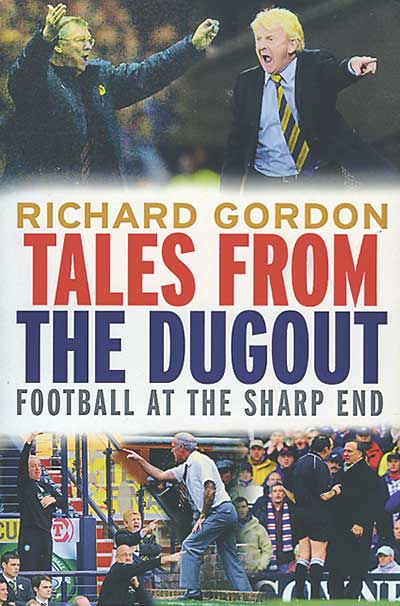 Football at the
sharp end
Football at the
sharp end
by Richard Gordon
Black and White, £9.99
Reviewed by Gordon Cairns
From WSC 349 March 2016
“Tales From The Technical Area” may have been a more pleasingly alliterative title, but the stories author Richard Gordon elicits from his subjects are generally of the more humble variety; summoning the sense of a damp bus shelter rather than a Perspex conservatory. The author is better known as the reasonable anchor man on Radio Scotland’s Sportsound among more excitable colleagues. Drawing on these radio connections he has amassed 48 interviews with a range of figures in the Scottish game. What is refreshing is that stories about Celtic and Rangers are minimal, allowing backroom staff and managers from smaller teams to tell their tales with a remarkable degree of candour.
Place is at the crux of Gordon’s book. This is not about what happens in the training ground or boardroom but on the sidelines and, to a lesser extent, the changing room. The tales are well told with the smoothness of an oft-repeated bar room anecdote, such as Stirling Albion manager Alex Smith stressing balance on the pitch in a half-time team talk after his players have just watched him falling through a door and down into the boiler room.
Gordon doesn’t editorialise, with each story told in the first person. Longer chapters by Craig Brown, Gordon Strachan and Pat Nevin among others are interspersed with pithy little stories from long-in-the-tooth professionals. One-time Chelsea coach Jim Duffy, acting as physio at a cash-strapped Falkirk reserve game, runs onto the pitch to treat a player when he realises he has mistakenly brought out a toilet bag, so he gels the stricken player’s hair which, Duffy claims, gets rid of his cramp.
Former Scotland manager Brown offers an insight into the importance of the positioning of the home and away dugouts, and where the away fans sit, in terms of influencing the referee through his linesmen. More outlandishly, he regrets not having the manager’s bench at Hampden Park on raised hydraulic legs to better see the unfolding of the game.
As the country’s most successful manager, it’s only natural to expect Alex Ferguson to cast a long shadow over this book; yet due to its anecdotal nature, he comes across as a one-dimensional, temperamental bully, seemingly only inspiring the future managers under his care not to act like him.
However, this is not the book to analyse managerial styles. What emerges instead is the chaotic nature of club management. Noel Whelan, for example, is angry at being subbed at half time for Aberdeen and heads straight for the bath until manager Jimmy Calderwood realises he has no one to replace him. Assistant Jimmy Nicholl is sent to get him back out but Whelan instead has a leisurely soak until the very last minute before retaking the pitch.
Tales From The Dugout also demonstrates the complicated nature of the relationship between manager, fourth official and referee, where managers admit to berating the referee because the crowd demands it, while the referee will have a word with the manager simply because the other officials expect him to. These sort of revelations, where names are named and embarrassing secrets shared, are the book’s greatest strength.